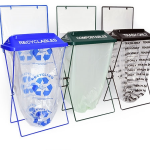Waste Diversion at Special Events and Large Venues
The City allows special event and large venue planners to borrow specialized collection containers for the three waste streams: trash, recycling, and food waste.
specialized collection containers for the three waste streams: trash, recycling, and food waste.
Here are some tips!
- Include recycling and organics in addition to trash from the start of the event planning process.
- Check with the facility to verify existing trash, recycling, and composting services. If these services will not meet your needs, contact the City for assistance in selecting appropriate recycling, compost, and trash containers for your event. Order extra service at least several weeks in advance.
- Identify who will be emptying the recycling, organics, and trash containers at the event. This is part of planning for the event and should not be done on the day of the event.
- Always place recycling and organics containers adjacent to trash containers — neither should ever be alone, since a lone recycling container will just fill up with trash and visa versa!
- Recycling, composting and trash containers should all be different colors (blue for recycling and green for compost, and black for trash).
- Proper signage on all containers is key. It should be clear what items can be recycled and composted — use graphics and provide the information in all commonly spoken languages whenever possible.
- Make sure trash cans are emptied regularly. If trash cans overflow, guests and staff will start using the available recycling and compost containers for trash.